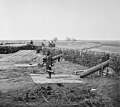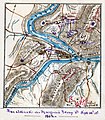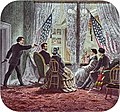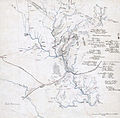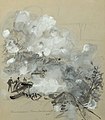 |
 |
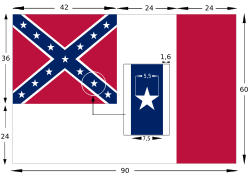
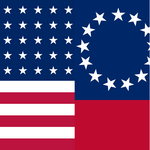
The American Civil War (1861–1865) was a sectional rebellion against the United States of America by the Confederate States, formed of eleven southern states' governments which moved to secede from the Union after the 1860 election of Abraham Lincoln as President of the United States. The Union's victory was eventually achieved by leveraging advantages in population, manufacturing and logistics and through a strategic naval blockade denying the Confederacy access to the world's markets.
In many ways, the conflict's central issues – the enslavement of African Americans, the role of constitutional federal government, and the rights of states – are still not completely resolved. Not surprisingly, the Confederate army's surrender at Appomattox on April 9,1865 did little to change many Americans' attitudes toward the potential powers of central government. The passage of the Thirteenth, Fourteenth and Fifteenth amendments to the Constitution in the years immediately following the war did not change the racial prejudice prevalent among Americans of the day; and the process of Reconstruction did not heal the deeply personal wounds inflicted by four brutal years of war and more than 970,000 casualties – 3 percent of the population, including approximately 560,000 deaths. As a result, controversies affected by the war's unresolved social, political, economic and racial tensions continue to shape contemporary American thought. The causes of the war, the reasons for the outcome, and even the name of the war itself are subjects of much discussion even today. (Full article)
USS Chickasaw was an ironclad Milwaukee-class river monitor built for the United States Navy during the American Civil War. The ship participated in the Battle of Mobile Bay in August 1864, during which she was lightly damaged, and the bombardments of Forts Gaines and Morgan as Union troops besieged the fortifications defending the bay. In March–April 1865, Chickasaw again supported Union forces during the Mobile Campaign as they attacked Confederate fortifications defending the city of Mobile, Alabama.
She was placed in reserve after the end of the war and sold in 1874. Her new owners converted Chickasaw into a train ferry in 1881 and renamed her Gouldsboro. The ship was later converted into a barge and remained in use until she sank sometime during the 1950s. Her wreck was discovered in the Mississippi River in New Orleans in 2003, although there are no plans to raise her. (Full article...)

During the American Civil War (1861–1865), Maryland, a slave state, was one of the border states, straddling the South and North. Despite some popular support for the cause of the Confederate States of America, Maryland did not secede during the Civil War. Governor Thomas H. Hicks, despite his early sympathies for the South, helped prevent the state from seceding.
Because the state bordered the District of Columbia and the opposing factions within the state strongly desired to sway public opinion towards their respective causes, Maryland played an important role in the war. The Presidency of Abraham Lincoln (1861–1865) suspended the constitutional right of habeas corpus from Washington to Philadelphia. Lincoln ignored the ruling of Chief Justice Roger B. Taney in "Ex parte Merryman" decision in 1861 concerning freeing John Merryman, a prominent Southern sympathizer arrested by the military. (Full article...)

Winfield Scott Hancock (February 14, 1824 – February 9, 1886) was a United States Army officer and the Democratic nominee for President of the United States in 1880. He served with distinction in the Army for four decades, including service in the Mexican–American War and as a Union general in the American Civil War. Known to his Army colleagues as "Hancock the Superb," he was noted in particular for his personal leadership at the Battle of Gettysburg in 1863. His military service continued after the Civil War, as Hancock participated in the military Reconstruction of the South and the U.S.'s western expansion and war with the Native Americans at the Western frontier. This concluded with the Medicine Lodge Treaty. From 1881 to 1885 he was president of the Aztec Club of 1847 for veteran officers of the Mexican-American War.
Hancock's reputation as a war hero at Gettysburg, combined with his status as a Unionist and supporter of states' rights, made him a potential presidential candidate. When the Democrats nominated him for president in 1880, he ran a strong campaign, but was narrowly defeated by Republican James A. Garfield. Hancock's last public service involved the oversight of President Ulysses S. Grant's funeral procession in 1885. (Full article...)
- ... that The Land We Love, a little magazine that merged into Southern Magazine, printed American Civil War recollections, poetry, agricultural material, and many works by female authors?
- ... that Dubuque, Arkansas, was destroyed in the American Civil War and is now covered by the waters of Bull Shoals Lake?
- ... that some historians believe that Steele's Greenville expedition marked a shift in the Union's war policy?
- ... that Romeo and Juliet both served in the Union Navy?
- ... that the Confederate States Navy ordered six Squib-class torpedo boats from England, but they were never delivered?
- ... that in the aftermath of the American Civil War, the only Black-led organization providing teachers to formerly enslaved people was the African Civilization Society?
- Attention needed
- ...to referencing and citation • ...to coverage and accuracy • ...to structure • ...to grammar • ...to supporting materials
- Popular pages
- Full list
- Cleanup needed
- The West Tennessee Raids
- Requested articles
- James Ashby (soldier) • Bluffton expedition • Benjamin D. Fearing • Charles A. Hickman • Richard Henry Jackson • James B. Speers • Charles S. Steedman • Battle of Barton's Station • Lawrence P. Graham • Thomas John Lucas • Daniel Henry Rucker • James Hughes Stokes • Frederick S. Sturmbaugh • Davis Tillson • Action at Nineveh (currently a redirect) • International response to the American Civil War • Spain and the American Civil War • Savannah Campaign Confederate order of battle • Native Americans in the American Civil War (currently disambiguation after deletion) • 1st Battalion, Mississippi Mounted Rifles (Union) • Battle of Lafayette • Requested American Civil War Medal of Honor recipients
- Expansion needed
- Battle of Boonsborough • Battle of Guard Hill • Battle of Rice's Station • Battle of Simmon's Bluff • Battle of Summit Point • Charleston Arsenal • Edenton Bell Battery • First Battle of Dalton • Blackshear Prison • Edwin Forbes • Hiram B. Granbury • Henry Thomas Harrison • Louis Hébert (colonel) • Benjamin G. Humphreys • Maynard Carbine • Hezekiah G. Spruill • Smith carbine • Edward C. Walthall • Confederate States Secretary of the Navy • Confederate States Secretary of the Treasury • David Henry Williams • Battle of Rome Cross Roads • Delaware in the American Civil War • Ironclad Board • United States Military Railroad • Kansas in the American Civil War • Rufus Daggett • Ebenezer Magoffin • Confederate Quartermaster-General's Department • First Corps, Army of Northern Virginia • Francis Laurens Vinton • Henry Maury • Smith's Expedition to Tupelo • Other American Civil War battle stubs • Other American Civil War stubs
- Images needed
- Battle of Lone Jack • Preston Pond, Jr. • Melancthon Smith
- Merging needed
- 1st Regiment New York Mounted Rifles and 7th Regiment New York Volunteer Cavalry
- Citations needed
- 1st Alabama Cavalry Regiment (Union) • 4th Maine Battery • 33rd Ohio Infantry • 110th New York Volunteer Infantry • Battle of Hatcher's Run • Camp Dennison • Confederate colonies • CSS Resolute • Dakota War of 1862 • Florida in the American Civil War • Ethan A. Hitchcock (general) • Fort Harker (Alabama) • Gettysburg (1993 film) • Iowa in the American Civil War • Second Battle of Fort Sumter • Samuel Benton
- Translation needed
The following Wikimedia Foundation sister projects provide more on this subject:
-
 Commons
Commons
Free media repository -
 Wikibooks
Wikibooks
Free textbooks and manuals -
 Wikidata
Wikidata
Free knowledge base -
 Wikinews
Wikinews
Free-content news -
 Wikiquote
Wikiquote
Collection of quotations -
 Wikisource
Wikisource
Free-content library -
 Wikiversity
Wikiversity
Free learning tools -
 Wikivoyage
Wikivoyage
Free travel guide -
 Wiktionary
Wiktionary
Dictionary and thesaurus
-

-

-

-

-
Random portal
- Shortcuts to this page: Portal:ACW • P:ACW




